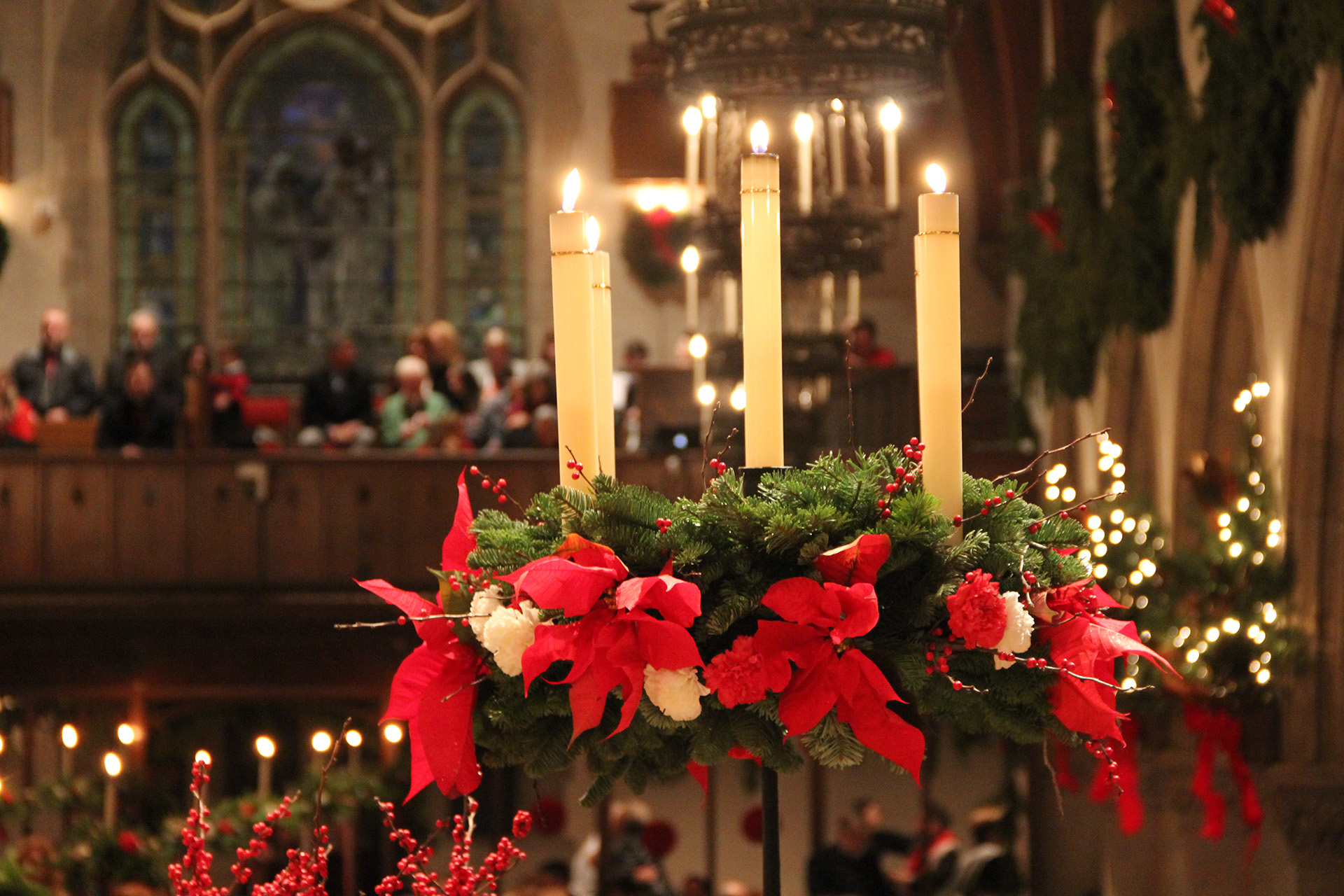The Gospel isn’t meant to be gulped down on Sunday morning, but gnawed on through the week so it really becomes a part of us. You’ve got to work at it, like a dog with a good bone! Here’s the Gospel for this coming Sunday — the Day of Pentecost — with food for thought on the truth that is God’s love for us. Gnaw away!
Day of Pentecost — John 15:26-27; 16:4b-15
Jesus said to the disciples, “When the Paraclete comes, the Spirit of Truth who comes from Abba God, whom I myself will send from my Abba – she will bear witness on my behalf. You too, must bear witness, for you have been with me from the beginning.
“I didn’t tell you this at first because I was with you. Now I am going to the One who sent me – yet not one of you has asked, ‘Where are you going?’ You’re sad of heart because I tell you this. Still, I must tell you the truth: it is much better for you that I go. If I fail to go, the Paraclete will never come to you, whereas if I go, I will send her to you. When she comes, she will prove the world wrong about sin, about justice and about judgment. About sin – in that they refuse to believe in me; about justice – because I go to Abba God and you will see me no more; about judgment – for the ruler of this world has been condemned.
“I have much more to tell you, but you can’t bear to hear it now. When the Spirit of truth comes, she will guide you into all truth. She won’t speak on her own initiative; rather she’ll speak only what she hears, and she’ll announce to you things that are yet to come. In doing this, the Spirit will give glory to me, for she will take what is mine and reveal it to you. Everything that Abba God has belongs to me. This is why I said that the Spirit will take what is mine and reveal it to you.”
The Backstory – What’s Going On Here?
It’s Pentecost — the Church’s remembrance of the gift of the Holy Spirit as recorded in [1]Acts 2:1-11 — so the people who put together the lectionary have pieced together some snippets of Jesus’ Farewell Discourse in John that look forward to this event. And like all instances of quoting things out of context, a little … well … context is helpful here!
Jesus’ words about the Spirit are surrounded by warnings about what the community that wrote John’s Gospel is already experiencing – intense persecution. The “world hates” them (15:18). Specifically, the synagogue authorities hate them and want them expelled. In addition to being worshipping communities, synagogues served as judicial assemblies — so the background for the listeners to this passage is that they are literally being dragged before a courtroom and accused of heretical crimes that have dire consequences (not just being put out of the synagogue but potentially being delivered up to the Roman authorities for death).
John’s Gospel has Jesus using courtroom language – bear witness, justice, judgment — and in so
doing turns the tables, assuring Jesus’ followers that it is not they who are on trial but “the world” (or, more likely, the synagogue) … and in this trial, the stakes are even higher and Jesus’ followers are assured of victory.
A few things to chew on:
*”… it is much better for you that I go” – What difficult words these are for Jesus’ disciples to hear. How could it be to their advantage for Jesus to die? Wouldn’t Jesus’ death be the ultimate fatal blow … cutting off their head, leaving them without not only their visionary leader but their savior. For any other organization, probably. But not for the Church. Because death is not the end. In body, God can be with them and lead them constrained by the limits of human form. But as Spirit, God is unconstrained — able to empower the people in new and amazing ways … to turn not just one human being but the whole people into the Body of Christ.
*”When the Spirit of truth comes, she will guide you into all the truth…” — As Hamlet would say, “Ay, there’s the rub!” When Jesus was around in human form, if the disciples did not understand, they could question and Jesus — to the point of exasperation sometimes — could try to explain himself and be clear. But since Pentecost, we have a gift of the Spirit that is also an incredible challenge for the Church. Because deeply faithful people, well-versed in scripture and immersed in prayer, can — and continually do — discern diametrically opposed definitions of “truth” that they have been “guided into” by the “Spirit of truth.” Hmmm … seems like a design flaw … or at least poor staff work by the Divine, right?
Actually, no. That the Spirit can not only be discerned but mis-discerned places we as followers of Jesus in need of deep humility. In the midst of language about God judging the world, we are reminded that we are not judge and jury … we are the blind trusting in a guide and knowing that we will make our share of missteps.
Try This:
The language Jesus uses is not the language of certainty (“I will give you precise instructions”) but the language of pilgrimage (“She will guide you into all truth.”).
Pilgrimage is not a crusade of certainty but a journey of humility. As pilgrims, we take our shoes off knowing that we are treading on holy ground. As pilgrims we seek first not to effect change based on our own ideas but to be changed by a wisdom beyond ourselves … knowing that it is through ourselves being changed, that God will change the world.
As we approach Pentecost, one of the most appropriate prayers is just three words:
God, change me.
This week, try to let that be your mantra. Try to have it be on your lips and in your heart as you rise in the morning and as you lie down at night. As you wait at a stoplight or take a deep breath before a difficult conversation. Pray it knowing that God is out there ready to respond … but pray it knowing your life may never be the same again.
“I want the truth!”
“You can’t handle the truth!”
Courtroom drama is not uncommon in the Bible. The prophets used the language of the court regularly (e.g. Jeremiah 51:36) and, in fact, it is God’s own ex-chief prosecutor, Satan (Job 1-2), that is now condemned as “the ruler of this world.”
But this courtroom drama is different. In this drama, the accuser becomes the accused. The powerful becomes the prisoner. And it happens in a subtle and most powerful way.
In the 1992 movie, [2]A Few Good Men, Tom Cruise’s Lionel Kaffee famously grills Jack Nicholson’s Col. Nathan Jessup on the stand. His strategy is brilliant. He will fill the Colonel with such hubris and self-righteousness that he will speak the truth that convicts himself … a truth that reveals a higher truth that will be his downfall.
In the movie’s most famous snippet from this movie, [3]Kaffee and Jessup have this exchange:
[4]Col. Jessup: You want answers?[5]Kaffee: I think I’m entitled to.
[6]Col. Jessup: *You want answers?*
[7]Kaffee: *I want the truth!*
[8]Col. Jessup: *You can’t handle the truth!*
… at which point Jessup erupts in a monologue of self-righteousness about what he believes truth to be. But in doing so he confesses to a breach of a higher and deeper truth … a truth about how human beings are supposed to treat one another. And Jessup, who walked into the courtroom as one of the most powerful people in America, walks out escorted by MPs as a prisoner.
The conviction that the truth of Christ brings is not an outsider pointing a finger at us. When confronted with the truth of Christ, we convict ourselves of our failings. AND … it’s OK. We fail. We fall short. AND … We are beautiful and powerful. We are infinitely loved and nothing can take that away.
The truth of Christ is that we can look at ourselves fully and not be afraid of seeing the places where we still need work … because those places do not make us less lovable or less worthy.
The truth of Christ is that, as Becca Stevens says, there is but one sacrament and it is healing. That acknowledging our wounds is not about shame but liberation … liberation from the need to hide those wounds. Liberation to the healing power of God.
The truth of Christ — that God loves the world infinitely and self-sacrificially and joyfully and calls us to “love one another as I have loved you.” — continually elicits Jessup-like responses in us. Responses like, “”That’s nice, but not very realistic.” or “I live in a different world than that.”
The love of Christ convicts us by revealing all the ways we fall short … but that’s where the movie similarities end. Because we are not Col. Jessup [9]but prodigal sons and daughters. And when we have our moments of conviction, we are welcomed back to try again and again. The well of healing from which we draw is limitless in depth.
Col. Jessup was wrong. We CAN handle the truth. We’ve just been given lies instead of the truth. The truth is God’s love for us … and it is deep. It is wide. It is forever.
. . . . . . . . . . . . . . . . . . . . . .
Check out the rest of Sunday’s readings
The Lectionary Page has all of the readings for this Sunday and every
Sunday – [10]just click here[11].
Collect for Sunday
Pray this throughout the week as you gnaw on this Gospel.
O God, who on this day taught the hearts of your faithful people by sending
to them the light of your Holy Spirit: Grant us by the same Spirit to have
a right judgment in all things, and evermore to rejoice in his holy
comfort; through Jesus Christ your Son our Lord, who lives and reigns with
you, in the unity of the Holy Spirit, one God, for ever and ever. Amen.
Want to read more?
[12]“The Text This Week” is an excellent online resource for anyone who
wants to dive more deeply into the scriptures for the week.
. . . . . . . . . . . . . . . . . . . . .
References
1. http://www.lectionarypage.net/YearB_RCL/Pentecost/BPentDay_RCL.html
2. http://www.imdb.com/title/tt0104257/
3. http://youtu.be/5j2F4VcBmeo
4. http://www.imdb.com/name/nm0000197/
5. http://www.imdb.com/name/nm0000129/
6. http://www.imdb.com/name/nm0000197/
7. http://www.imdb.com/name/nm0000129/
8. http://www.imdb.com/name/nm0000197/
9. http://bible.oremus.org/?ql=204617818
10. http://www.lectionarypage.net/YearB_RCL/Pentecost/BPentDay_RCL.html
11. http://www.lectionarypage.net/YearB_RCL/Easter/BEaster5_RCL.html
12. http://www.textweek.com/



